
The Yeomen of the Guard
Encyclopedia
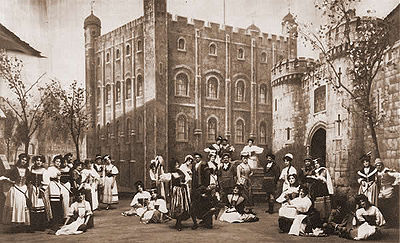
Savoy opera
The Savoy Operas denote a style of comic opera that developed in Victorian England in the late 19th century, with W. S. Gilbert and Arthur Sullivan as the original and most successful practitioners. The name is derived from the Savoy Theatre, which impresario Richard D'Oyly Carte built to house...
, with music by Arthur Sullivan
Arthur Sullivan
Sir Arthur Seymour Sullivan MVO was an English composer of Irish and Italian ancestry. He is best known for his series of 14 operatic collaborations with the dramatist W. S. Gilbert, including such enduring works as H.M.S. Pinafore, The Pirates of Penzance and The Mikado...
and libretto by W. S. Gilbert
W. S. Gilbert
Sir William Schwenck Gilbert was an English dramatist, librettist, poet and illustrator best known for his fourteen comic operas produced in collaboration with the composer Sir Arthur Sullivan, of which the most famous include H.M.S...
. It premiered at the Savoy Theatre
Savoy Theatre
The Savoy Theatre is a West End theatre located in the Strand in the City of Westminster, London, England. The theatre opened on 10 October 1881 and was built by Richard D'Oyly Carte on the site of the old Savoy Palace as a showcase for the popular series of comic operas of Gilbert and Sullivan,...
on 3 October 1888, and ran for 423 performances. This was the eleventh collaboration of fourteen between Gilbert and Sullivan
Gilbert and Sullivan
Gilbert and Sullivan refers to the Victorian-era theatrical partnership of the librettist W. S. Gilbert and the composer Arthur Sullivan . The two men collaborated on fourteen comic operas between 1871 and 1896, of which H.M.S...
.
The opera is set in the Tower of London
Tower of London
Her Majesty's Royal Palace and Fortress, more commonly known as the Tower of London, is a historic castle on the north bank of the River Thames in central London, England. It lies within the London Borough of Tower Hamlets, separated from the eastern edge of the City of London by the open space...
, during the 16th century, and is the darkest, and perhaps most emotionally engaging, of the Savoy Operas, ending with a broken-hearted main character and two very reluctant engagements, rather than the usual numerous marriages. The libretto does contain considerable humour, including a lot of pun-laden one-liners, but Gilbert's trademark satire
Satire
Satire is primarily a literary genre or form, although in practice it can also be found in the graphic and performing arts. In satire, vices, follies, abuses, and shortcomings are held up to ridicule, ideally with the intent of shaming individuals, and society itself, into improvement...
and topsy-turvy plot complications are subdued in comparison with the other Gilbert and Sullivan operas. The dialogue, though in prose, is quasi-Shakespearian
William Shakespeare
William Shakespeare was an English poet and playwright, widely regarded as the greatest writer in the English language and the world's pre-eminent dramatist. He is often called England's national poet and the "Bard of Avon"...
, or early modern English
Early Modern English
Early Modern English is the stage of the English language used from about the end of the Middle English period to 1650. Thus, the first edition of the King James Bible and the works of William Shakespeare both belong to the late phase of Early Modern English...
, in style.
Critics considered the score to be Sullivan's finest, including its overture, which is in sonata form
Sonata form
Sonata form is a large-scale musical structure used widely since the middle of the 18th century . While it is typically used in the first movement of multi-movement pieces, it is sometimes used in subsequent movements as well—particularly the final movement...
, rather than being written as a sequential pot-pourri
Potpourri (music)
Potpourri or Pot-Pourri is a kind of musical form structured as ABCDEF..., the same as medley or, sometimes, fantasia. It is often used in light, easy-going and popular types of music....
of tunes from the opera, as in most of the other Gilbert and Sullivan overtures. This was the first Savoy Opera to use Sullivan's larger orchestra, including a second bassoon and third trombone. Most of Sullivan's subsequent operas, including those not composed with Gilbert as librettist, use this larger orchestra.
Genesis of the opera
When the previous Gilbert and Sullivan opera, RuddigoreRuddigore
Ruddigore; or, The Witch's Curse, originally called Ruddygore, is a comic opera in two acts, with music by Arthur Sullivan and libretto by W. S. Gilbert. It is one of the Savoy Operas and the tenth of fourteen comic operas written together by Gilbert and Sullivan...
, finished its run at the Savoy Theatre
Savoy Theatre
The Savoy Theatre is a West End theatre located in the Strand in the City of Westminster, London, England. The theatre opened on 10 October 1881 and was built by Richard D'Oyly Carte on the site of the old Savoy Palace as a showcase for the popular series of comic operas of Gilbert and Sullivan,...
, no new Gilbert and Sullivan opera was ready, and for nearly a year the stage was devoted to revivals of such old successes as H.M.S. Pinafore
H.M.S. Pinafore
H.M.S. Pinafore; or, The Lass That Loved a Sailor is a comic opera in two acts, with music by Arthur Sullivan and a libretto by W. S. Gilbert. It opened at the Opera Comique in London, England, on 25 May 1878 and ran for 571 performances, which was the second-longest run of any musical...
, The Pirates of Penzance
The Pirates of Penzance
The Pirates of Penzance; or, The Slave of Duty is a comic opera in two acts, with music by Arthur Sullivan and libretto by W. S. Gilbert. The opera's official premiere was at the Fifth Avenue Theatre in New York City on 31 December 1879, where the show was well received by both audiences...
and The Mikado
The Mikado
The Mikado; or, The Town of Titipu is a comic opera in two acts, with music by Arthur Sullivan and libretto by W. S. Gilbert, their ninth of fourteen operatic collaborations...
. For several years leading up to the premiere of Yeomen, Sullivan had expressed the desire to leave his partnership with W.S. Gilbert in order to turn to writing grand opera
Grand Opera
Grand opera is a genre of 19th-century opera generally in four or five acts, characterised by large-scale casts and orchestras, and lavish and spectacular design and stage effects, normally with plots based on or around dramatic historic events...
and other serious works full time. Before the premiere of Yeomen, Sullivan had recently been lauded for the successful oratorio The Golden Legend and would produce his grand opera
Grand Opera
Grand opera is a genre of 19th-century opera generally in four or five acts, characterised by large-scale casts and orchestras, and lavish and spectacular design and stage effects, normally with plots based on or around dramatic historic events...
, Ivanhoe
Ivanhoe (opera)
Ivanhoe is a romantic opera in three acts based on the novel by Sir Walter Scott, with music by Sir Arthur Sullivan and a libretto by Julian Sturgis. It premiered at the Royal English Opera House on 31 January 1891 for a consecutive run of 155 performances, unheard of for a grand opera...
, only 15 months after Yeomen.
In the autumn of 1887, after another attempt to interest his collaborator in a plot where the characters, by swallowing a magic pill, became who they were pretending to be (Sullivan had rejected this idea before), Gilbert made an effort to meet his collaborator half way. Gilbert claimed that the idea for the opera came to him while he was waiting for the train in Uxbridge
Uxbridge
Uxbridge is a large town located in north west London, England and is the administrative headquarters of the London Borough of Hillingdon. It forms part of the ceremonial county of Greater London. It is located west-northwest of Charing Cross and is one of the major metropolitan centres...
and spotted an advertisement for The Tower Furnishing and Finance Company, illustrated with a Beefeater. On Christmas Day, 1887, he read to Sullivan and Carte his plot sketch for an opera set at the Tower of London. Sullivan was "immensely pleased" and, with much relief, accepted it, writing in his diary, "Pretty story, no topsy turvydom, very human, & funny also".
Although not a grand opera, Yeomen provided Sullivan with the opportunity to write his most ambitious score to date. The two set to work on the new opera, taking longer to prepare it than they had taken with many of their earlier works. Gilbert made every effort to accommodate his collaborator, even writing alternative lyrics to some songs. Sullivan had trouble setting one lyric in particular, "I have a song to sing-O!", with its increasing length in each stanza. He asked Gilbert if he had anything in mind when writing it. Gilbert hummed a few lines from a sea shanty
Sea shanty
A shanty is a type of work song that was once commonly sung to accompany labor on board large merchant sailing vessels. Shanties became ubiquitous in the 19th century era of the wind-driven packet and clipper ships...
, and Sullivan knew what to do.
The first act was rather long and contained an unusual number of sentimental pieces. As opening night approached, Gilbert became increasingly apprehensive. Would the audience accept this serious, sentimental tone from one of the duo's "comic" operas? Gilbert and Sullivan cut two songs from Act I and part of the Act I finale, partly to decrease the number of sentimental pieces near the beginning of the opera. Gilbert, always nervous himself on opening nights, came backstage before the performance on opening night to "have a word" with some of the actors, inadvertently conveying his worries to the cast and making them even more nervous. Jessie Bond
Jessie Bond
Jessie Bond was an English singer and actress best known for creating the mezzo-soprano soubrette roles in the Gilbert and Sullivan comic operas. She spent twenty years on the stage, the bulk of them with the D'Oyly Carte Opera Company.Musical from an early age, Bond began a concert singing...
, who was to open the show with a solo song alone on stage, finally said to him, "For Heaven's sake, Mr. Gilbert, go away and leave me alone, or I shan't be able to sing a note!"
Analysis of the text and music
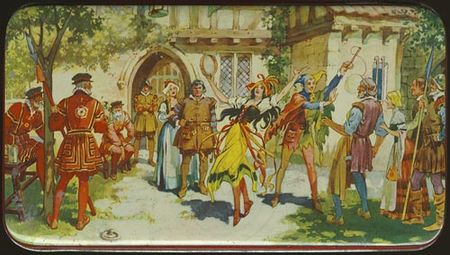
- The accompaniments...are delightful to hear, and especially does the treatment of the woodwind compel admiring attention. Schubert himself could hardly have handled those instruments more deftly, written for them more lovingly.... We place the songs and choruses in The Yeomen of the Guard before all his previous efforts of this particular kind. Thus the music follows the book to a higher plane, and we have a genuine English opera, forerunner of many others, let us hope, and possibly significant of an advance towards a national lyric stage. (Allen, p. 312).
The Times noted, "It should... be acknowledged that Mr. Gilbert has earnestly endeavoured to leave familiar grooves and rise to higher things." Some reviewers, however, suggested that Gilbert took too much of his story from William Vincent Wallace
William Vincent Wallace
William Vincent Wallace was an Irish composer and musician.-Early life:Wallace was born at Colbeck Street, Waterford, Ireland. Both parents were Irish, his father, of County Mayo, was a regimental bandmaster....
's 1845 opera, Maritana
Maritana
Maritana is a grand opera in three acts composed by William Vincent Wallace, with a libretto by Edward Fitzball . The opera is based on the play Don César de Bazan by Adolphe d'Ennery and Philippe François Pinel Dumanoir , which was also the source material for Jules Massenet's opéra comique Don...
, in which a street singer is married in secret to a gentleman. Another antecedent of Yeomen is Gilbert's 1875 tragedy, Broken Hearts
Broken Hearts
Broken Hearts is a blank verse play by W. S. Gilbert in three acts styled "An entirely original fairy play". It opened at the Royal Court Theatre in London on 9 December 1875, running for three months, and toured the provinces in 1876...
. There, the love triangle among Prince Florian, Lady Vavir and the hunchbacked servant Mousta parallels the triangle in Yeomen among Fairfax, Elsie and Point.
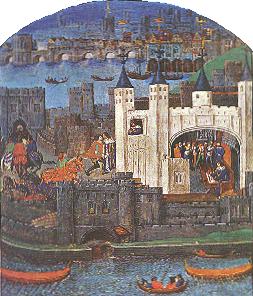
Yeomen Warders
The Yeomen Warders of Her Majesty’s Royal Palace and Fortress the Tower of London, and Members of the Sovereign's Body Guard of the Yeoman of the Guard Extraordinary, popularly known as the Beefeaters, are ceremonial guardians of the Tower of London...
of Her Majesty's Royal Palace and Fortress, the Tower of London," popularly known as the "Beefeaters". These are guardians of the Tower of London
Tower of London
Her Majesty's Royal Palace and Fortress, more commonly known as the Tower of London, is a historic castle on the north bank of the River Thames in central London, England. It lies within the London Borough of Tower Hamlets, separated from the eastern edge of the City of London by the open space...
(and the crown jewels
Crown Jewels of the United Kingdom
The collective term Crown Jewels denotes the regalia and vestments worn by the sovereign of the United Kingdom during the coronation ceremony and at other state functions...
) who are selected for this position as a reward for long and meritorious service to the crown. Today, they act as tour guides at the Tower of London. The Yeomen Warders are often incorrectly referred to as Yeomen of the Guard
Yeomen of the Guard
The Queen's Body Guard of the Yeomen of the Guard are a bodyguard of the British Monarch. The oldest British military corps still in existence, it was created by Henry VII in 1485 at the Battle of Bosworth Field. As a token of this venerability, the Yeomen still wear red and gold uniforms of Tudor...
, which is actually a distinct corps of royal bodyguards. Gilbert shared this confusion (or didn't care to be precise in the matter) by naming the opera The Yeomen of the Guard. However, Gilbert and Sullivan were careful to replicate the historical Tower as closely as possible in the opera's settings, costumes and music. For instance, during the Act I finale, the bell of St. Peter's tolls for the coming execution as was the custom at the time.
Legacy
The character of the Lieutenant of the Tower, Sir Richard CholmondeleyRichard Cholmondeley
Sir Richard Cholmondeley was an English farmer and soldier, who served as Lieutenant of the Tower of London from 1513 to 1520 during the reign of Henry VIII. He is remembered because of his tomb at the Tower of London and because he is fictionalized as a character in Gilbert and Sullivan's...
, is the only character in all of the Gilbert and Sullivan operas that is based overtly on an historical figure. Cholmondeley was the Lieutenant of the Tower from 1513 to 1520, during the reign of Henry VIII
Henry VIII of England
Henry VIII was King of England from 21 April 1509 until his death. He was Lord, and later King, of Ireland, as well as continuing the nominal claim by the English monarchs to the Kingdom of France...
. Cholmondeley lost some favour with the City of London
City of London
The City of London is a small area within Greater London, England. It is the historic core of London around which the modern conurbation grew and has held city status since time immemorial. The City’s boundaries have remained almost unchanged since the Middle Ages, and it is now only a tiny part of...
authorities during the Evil May Day
Evil May Day
Evil May Day or Ill May Day is the name of a riot which took place in 1517 as a protest against foreigners living in London.- Causes :...
riots of 1517: He ordered the firing of some of the Tower's artillery at the city to try to quell rioting by gangs of young Londoners who took control of London for several days and were attacking foreigners, especially the wealthy foreign merchants and bankers of Lombard Street, London
Lombard Street, London
Lombard Street is a street in the City of London.It runs from the corner of the Bank of England at its north-west end, where it meets a major junction including Poultry, King William Street, and Threadneedle Street, south-east to Gracechurch Street....
. Nevertheless, Cholmondeley continued serving at the Tower for three more years until ill-health forced him to resign. He was responsible for the rebuilding of the chapel of St Peter ad Vincula, the parish church of the Tower of London, where there is a prominent tomb in his memory.
A monument in Sullivan's memory was erected in the Victoria Embankment Gardens (London) and is inscribed with a lyric from Yeomen: "Is life a boon? If so, it must befall that Death, whene'er he call, must call too soon". In 1962, 1964, 1966, 1978 and 2009, the opera was staged before large audiences in the moat of the Tower of London.
Roles
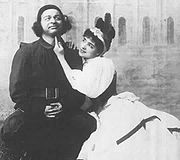
- Sir Richard CholmondeleyRichard CholmondeleySir Richard Cholmondeley was an English farmer and soldier, who served as Lieutenant of the Tower of London from 1513 to 1520 during the reign of Henry VIII. He is remembered because of his tomb at the Tower of London and because he is fictionalized as a character in Gilbert and Sullivan's...
, Lieutenant of the Tower (baritoneBaritoneBaritone is a type of male singing voice that lies between the bass and tenor voices. It is the most common male voice. Originally from the Greek , meaning deep sounding, music for this voice is typically written in the range from the second F below middle C to the F above middle C Baritone (or...
) - Colonel Fairfax, under sentence of death (tenorTenorThe tenor is a type of male singing voice and is the highest male voice within the modal register. The typical tenor voice lies between C3, the C one octave below middle C, to the A above middle C in choral music, and up to high C in solo work. The low extreme for tenors is roughly B2...
) - Sergeant Meryll of the Yeomen of the Guard (bass-baritoneBass-baritoneA bass-baritone is a high-lying bass or low-lying "classical" baritone voice type which shares certain qualities with the true baritone voice. The term arose in the late 19th century to describe the particular type of voice required to sing three Wagnerian roles: the Dutchman in Der fliegende...
) - Leonard Meryll, his son (tenorTenorThe tenor is a type of male singing voice and is the highest male voice within the modal register. The typical tenor voice lies between C3, the C one octave below middle C, to the A above middle C in choral music, and up to high C in solo work. The low extreme for tenors is roughly B2...
) - Jack Point, a strolling jester (comic baritone)
- Wilfred Shadbolt, Head Jailer and Assistant Tormentor (bass-baritoneBass-baritoneA bass-baritone is a high-lying bass or low-lying "classical" baritone voice type which shares certain qualities with the true baritone voice. The term arose in the late 19th century to describe the particular type of voice required to sing three Wagnerian roles: the Dutchman in Der fliegende...
or baritoneBaritoneBaritone is a type of male singing voice that lies between the bass and tenor voices. It is the most common male voice. Originally from the Greek , meaning deep sounding, music for this voice is typically written in the range from the second F below middle C to the F above middle C Baritone (or...
) - The Headsman (silent)
- First Yeoman (tenorTenorThe tenor is a type of male singing voice and is the highest male voice within the modal register. The typical tenor voice lies between C3, the C one octave below middle C, to the A above middle C in choral music, and up to high C in solo work. The low extreme for tenors is roughly B2...
) - Second Yeoman (baritoneBaritoneBaritone is a type of male singing voice that lies between the bass and tenor voices. It is the most common male voice. Originally from the Greek , meaning deep sounding, music for this voice is typically written in the range from the second F below middle C to the F above middle C Baritone (or...
) - Third Yeoman (tenorTenorThe tenor is a type of male singing voice and is the highest male voice within the modal register. The typical tenor voice lies between C3, the C one octave below middle C, to the A above middle C in choral music, and up to high C in solo work. The low extreme for tenors is roughly B2...
) – see "Cut music" - Fourth Yeoman (bass) – see "Cut music"
- First Citizen (speaking/chorus)
- Second Citizen (speaking/chorus)
- Elsie Maynard, a strolling singer (sopranoSopranoA soprano is a voice type with a vocal range from approximately middle C to "high A" in choral music, or to "soprano C" or higher in operatic music. In four-part chorale style harmony, the soprano takes the highest part, which usually encompasses the melody...
) - Phœbe Meryll, Sergeant Meryll's daughter (mezzo-sopranoMezzo-sopranoA mezzo-soprano is a type of classical female singing voice whose range lies between the soprano and the contralto singing voices, usually extending from the A below middle C to the A two octaves above...
) - Dame Carruthers, Housekeeper to the Tower (contraltoContraltoContralto is the deepest female classical singing voice, with the lowest tessitura, falling between tenor and mezzo-soprano. It typically ranges between the F below middle C to the second G above middle C , although at the extremes some voices can reach the E below middle C or the second B above...
) - Kate, her niece (sopranoSopranoA soprano is a voice type with a vocal range from approximately middle C to "high A" in choral music, or to "soprano C" or higher in operatic music. In four-part chorale style harmony, the soprano takes the highest part, which usually encompasses the melody...
) - Chorus of Yeomen WardersYeomen WardersThe Yeomen Warders of Her Majesty’s Royal Palace and Fortress the Tower of London, and Members of the Sovereign's Body Guard of the Yeoman of the Guard Extraordinary, popularly known as the Beefeaters, are ceremonial guardians of the Tower of London...
, gentlemen, citizens, etc.
Synopsis
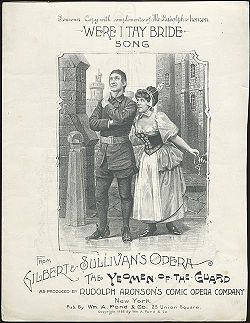
Act I
Phoebe Meryll sits at the spinning wheel, sighing about the pain of love. Wilfred Shadbolt, the head jailer and assistant torturer at the Tower of London enters, and Phoebe mocks him, disgusted by his profession. Wilfred, who is in love with Phoebe, has noticed her interest in one of the prisoners at the Tower, Colonel Fairfax. He gleefully conveys the news that Fairfax is to be beheaded, for the crime of sorcery, that very day. Phoebe replies that Fairfax is merely a scientist and alchemist (and a handsome one at that) and leaves Wilfred to suffer from his love for her. The citizens and Yeomen arrive, singing of the Yeomen's bravery and valiant deeds. Dame Carruthers, the housekeeper of the Tower, dismisses protestations by Phoebe of Fairfax's innocence and, vexed by Phoebe's criticism of the Tower, sings its praises. After everyone leaves, Phoebe is joined by her father, Sergeant Meryll, who reports that her brother Leonard has been appointed a Yeoman for his valour in battle. Leonard is on his way from Windsor, where the court sits, and may bring with him a reprieve for the Colonel. Leonard Meryll enters bearing a despatch for the Lieutenant of the Tower but no reprieve. Sergeant Meryll is eager to save Fairfax, for the Colonel served with him in battle and twice saved Sergeant Meryll's life. He hatches a plan: Leonard will hide away and Fairfax, sprung from his cell, will assume Leonard's guise. Phoebe is charged with getting the key to Fairfax's cell from the lovesick jailer, Wilfred.Fairfax enters under guard by an escort of Yeomen. Sir Richard Cholmondeley, the Lieutenant of the Tower, sees him and greets him sadly, as they are old friends. Fairfax bears his impending execution bravely and philosophically, prompting tears from Phoebe and even Sergeant Meryll. Fairfax asks a boon of the Lieutenant: the charge of sorcery was the doing of his wicked cousin Sir Clarence Poltwhistle, a Secretary of State, who will inherit his estate if he dies unmarried. He therefore wishes to be married by his confessor to any available woman, it matters not whom, who will receive a hundred crowns for her hour of matrimony. The Lieutenant agrees and leaves.
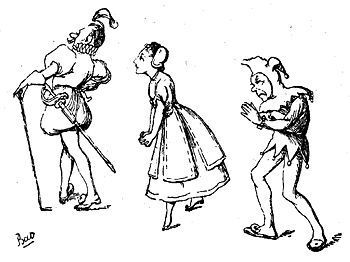
Wilfred leads Elsie back from her anonymous meeting with the priest and the prisoner and leaves her to reflect on her impending widowhood. Meanwhile, Wilfred wonders what they were up to in Fairfax's cell. Phoebe arrives and seductively distracts him as she steals his keys, which she gives surreptitiously to her father, who goes to free Fairfax from his cell. She keeps Wilfred busy until her father returns the keys, which she returns to Wilfred's belt, and leaves the confused and hopeful jailer to his fantasies of marrying her. Meryll disguises Fairfax as his son Leonard.
The Yeomen come to greet "Leonard", who insists that the tales of his bravery are exaggerated. He flounders when Phoebe greets him, not having been introduced to her, but Wilfred helpfully identifies her, telling Fairfax (with a strong dose of wishful thinking) that he, Wilfred, is betrothed to Phoebe. He commends her to the care of her "brother" until the marriage. The headsman enters, and all is ready for the execution. Wilfred, Fairfax (still disguised as Leonard) and two Yeomen go to fetch Fairfax. The Yeomen return and Fairfax announces his own disappearance. The Lieutenant blames the jailer, Wilfred, and declares his life forfeit instead. Wilfred protests his innocence and all wonder – not all honestly – how the prisoner could have escaped. Point is distraught at the escape of Elsie's husband, and Elsie faints into Fairfax's arms, as all rush off to hunt for Fairfax.
Act II
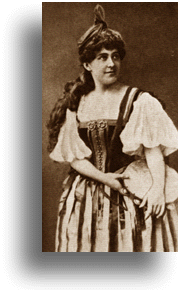
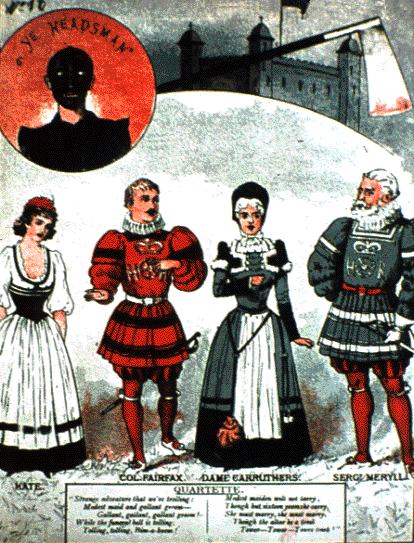
Just then, a shot is heard from the wharf and everyone enters. Wilfred, with the jester's corroboration, declares that he struggled with someone creeping about, discovered it was Colonel Fairfax, who dove into the river, and seizing an arquebus
Arquebus
The arquebus , or "hook tube", is an early muzzle-loaded firearm used in the 15th to 17th centuries. The word was originally modeled on the German hakenbüchse; this produced haquebute...
, Wilfred shot him dead. The Lieutenant orders the Yeomen to search for the body, and Wilfred is celebrated as a hero. Elsie, Fairfax, Phoebe and Point are left alone, and Point asks Elsie, as she is now free, to marry him. Fairfax, still disguised as "Leonard", tells Point that he doesn't know how to woo (it is not to be done in the manner of a jester!), and he undertakes to instruct Point in this art, following this up with a most effective demonstration on Elsie. Point, slow to see that Fairfax is wooing the girl for himself (and that Elsie has fallen for the heroic "Leonard"), finally protests. Fairfax tells Point that he has shown him how to woo and that he should apply the teachings "elsewhere". Phoebe, seeing her adored Fairfax pledged to another, bursts into tears, while Point, shocked by the turn of events, wishes he was dead.
Wilfred sees Phoebe weeping and she, rendered incautious by anger and hurt, and by her scorn for the jailer, inadvertently reveals that "Leonard" is in fact Fairfax. Realizing the game is up, she desperately buys Wilfred's silence by agreeing to marry him (after a long engagement). The real Leonard then returns and announces that Fairfax's reprieve has finally arrived. Sergeant Meryll enters, followed surreptitiously by Dame Carruthers. Phoebe tells him of her folly and goes with Wilfred, whereupon Dame Carruthers reveals herself to Meryll and threatens to expose the three schemers who had freed Fairfax illegally. He resignedly buys her silence with his offer of marriage.
Elsie arrives joyfully for her wedding to the man she still knows as "Leonard", but the Lieutenant arrives and announces that her husband Fairfax lives. Fairfax arrives dressed for the wedding, but Elsie, distraught over the loss of "Leonard", does not turn to see his face. He teases his wife, keeping up the pretence for another minute. Elsie begs for his mercy, to free her to go to her love, "Leonard", but he says that his heart is like a "massive rock" and claims her as his bride. Finally Elsie turns to see his face, and finally recognises him as her adored one. All once again erupt into joy, except the broken-hearted Jack Point. Tearfully, he reprises the song that he had earlier sung with Elsie, The Merryman and his Maid, with wrenching sorrow. Elsie "drops a tear" for Point, but turns back to her love. As the chorus turns away to celebrate the marriage of Fairfax and Elsie, Point falls insensible at their feet.
Musical numbers
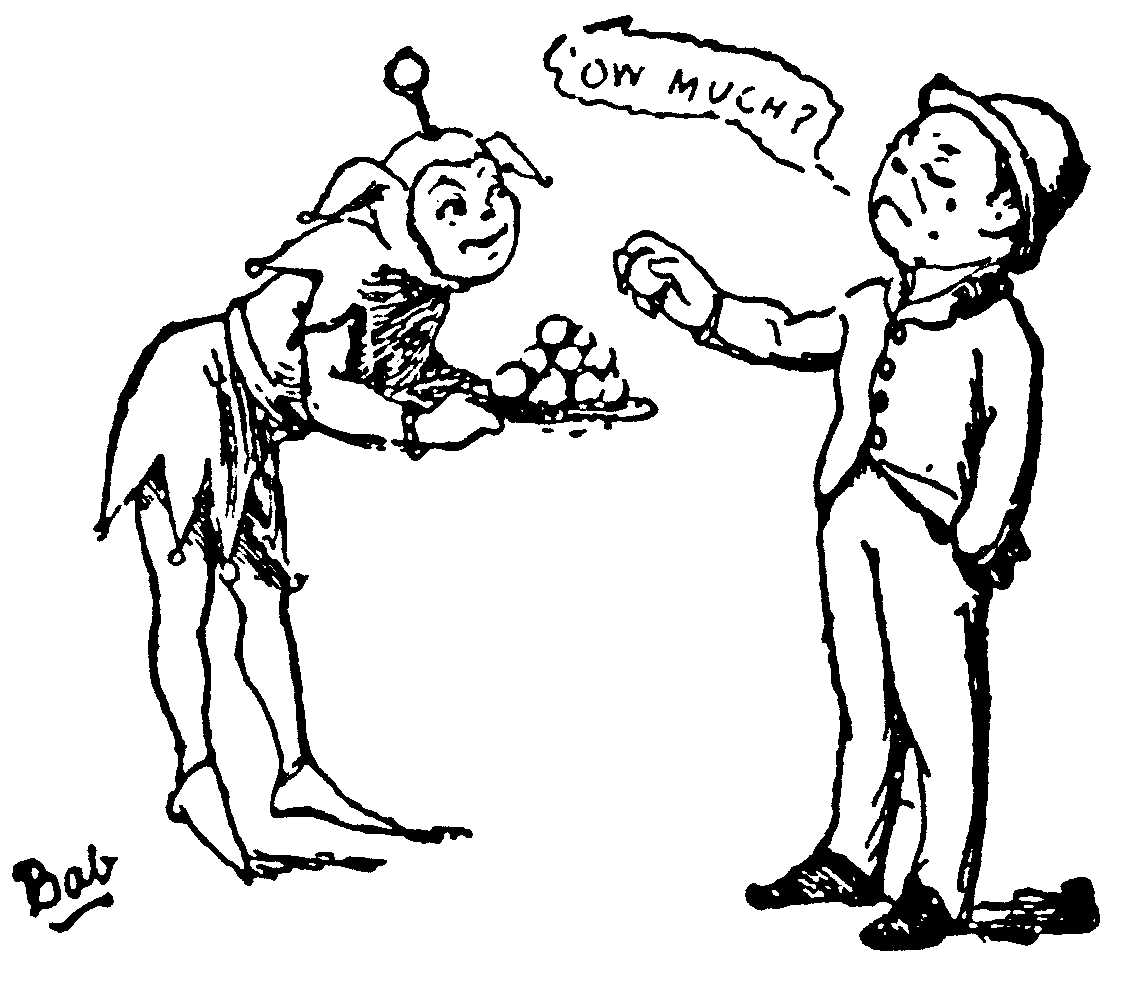
- Overture
Act I
- 1. "When maiden loves, she sits and sighs" (Phœbe)
- 1a. "When jealous torments rack my soul" (Wilfred) – see "Cut music"
- 2. "Tower warders, under orders" (Crowd and Yeomen, solo Second Yeoman)
- 3. "When our gallant Norman foes" (Dame Carruthers and Yeomen)
- 3a. "A laughing boy but yesterday" (Meryll); – see "Cut music"
- 4. "Alas! I waver to and fro" (Phœbe, Leonard and Meryll)
- 5. "Is life a boon?" (Fairfax)
- 6. "Here's a man of jollity" (Chorus)
- 7. "I have a song to sing, O!" (or, "The Merryman and his Maid") (Point, Elsie, and chorus)
- 8. "How say you, maiden, will you wed?" (Lieutenant, Elsie, Point)
- 9. "I've jibe and joke" (Point)
- 10. "'Tis done! I am a bride!" (Elsie)
- 11. "Were I thy bride" (Phœbe)
- 12. Finale Act I (Ensemble)
- "Oh, Sergeant Meryll, is it true?"
- "To thy fraternal care, thy sister I commend"
- "The pris'ner comes to meet his doom"
- "M'lord, m'lord.... As escort for the prisoner"
- "All frenzied, frenzied with despair they rave"
Act II
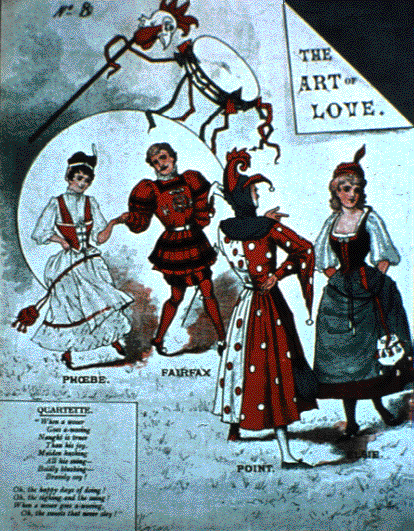
- 13. "Night has spread her pall once more" (People, Dame Carruthers, Yeomen)
- 14. "Oh! a private buffoon is a light-hearted loon" (Point)
- 15. "Hereupon we're both agreed" (Point and Wilfred)
- 16. "Free from his fetters grim" (Fairfax)
- 17. "Strange adventure" (Kate, Dame Carruthers, Fairfax, Meryll)
- 18. "Hark! What was that, sir?" ... "Like a ghost his vigil keeping" (Meryll, Fairfax, Lieutenant, Wilfred, Point, Ensemble)
- 19. "A man who would woo a fair maid" (Fairfax, Elsie, Phœbe)
- 20. "When a wooer goes a-wooing" (Elsie, Fairfax, Phœbe, Point)
- 21. "Rapture, rapture" (Dame Carruthers, Sergeant Meryll)
- 22. Finale Act II (Ensemble)
- "Comes the pretty young bride"
- "Oh, day of terror!"
- "Leonard, my loved one, come to me"
- "I have a song to sing, O!"
Cut music
Like most of the Savoy Operas, Yeomen went through significant cuts and alterations during rehearsal, and there were further changes after the authors' deaths that have become traditional. Yeomen is unusual, however, in the amount of cut music that survives, has been recorded, and is available for performance.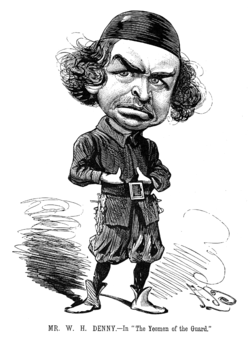
Rutland Barrington
Rutland Barrington was an English singer, actor, comedian, and Edwardian musical comedy star. Best remembered for originating the lyric baritone roles in the Gilbert and Sullivan operas from 1877 to 1896, his performing career spanned more than four decades...
, took a leave from the company to try his hand as a producer and theatre manager. It was intended to be sung after Phoebe's opening solo in Act I, "When maiden loves", and the ensuing passage of dialogue between Phoebe and Wilfred. In recent decades this song has been occasionally restored.
Just before Leonard's entrance in the first act, Sergeant Meryll originally had a nostalgic solo about his son Leonard's childhood, "A laughing boy but yesterday". This number did not please Gilbert, who called it an "introduced and wholly irrelevant song." It was sung in the first night performance, but was cut thereafter. It was restored, possibly for the first time, in 1962, for a production at the Tower of London, and has been heard in a number of recordings and productions since, without becoming part of the standard score.
Before opening night, the third and fourth yeomen's couplets in the Act I finale – in which they remind "Leonard" of his brave deeds – were cut, though they remained in the vocal score until around the 1920s. The third yeoman had also joined Fairfax when he tells the Lieutenant that the prisoner has escaped. When the solo couplets were cut, the third yeoman was deleted from this passage as well, leaving it a trio for Fairfax and two other yeomen.
Fairfax's first solo, "Is life a boon?", is the second version of that song. Gilbert thought that Sullivan's first setting (in 6/8 time) was too similar to many of the other tenor ballads in the Savoy Operas, and he urged the composer to rewrite it. Sullivan complied, but also saved the first version, leaving an unusual example of two separate settings of the same lyric. The revised version is invariably used in performance.
The Act II duet for Sergeant Meryll and Dame Carruthers, "Rapture, rapture", was often cut in 20th-century D'Oyly Carte Opera Company
D'Oyly Carte Opera Company
The D'Oyly Carte Opera Company was a professional light opera company that staged Gilbert and Sullivan's Savoy operas. The company performed nearly year-round in the UK and sometimes toured in Europe, North America and elsewhere, from the 1870s until it closed in 1982. It was revived in 1988 and...
performances, apparently because it was thought to detract from the serious tone of the work. However, D'Oyly Carte eventually restored the duet, and in modern productions it is usually performed. As originally written, the duet ended with transitional music leading directly into the Act II finale. Those measures do not appear in vocal scores, and modern performances usually delete them, bringing the duet to a full close so that the opening bars of the finale are not covered by applause.
At some point, before 1920 or so, the "Oh day of terror" section had the parts for Kate and Phoebe significantly reduced. In the original conception, these characters echoed Elsie, with an "Oh, Leonard" solo for Kate, and cries to "Come thou to her side, and claim her as thy loving bride" sung along with Elsie. The modern version leaves Elsie singing her line by herself, puts Kate with the chorus, gives Phoebe a mixture of Dame Carruthers' part and her old one, and changes Phoebe and Dame Carruthers' lyrics. There was one other cut made after Gilbert's death: Separate lyrics for Elsie and Point, not found elsewhere, were cut during the "All frenzied, frenzied with despair they rave" section of the Act I finale.
The 1993 D'Oyly Carte recording includes all the cut music and both versions of "Is life a boon?"
Productions
The Yeomen of the Guard was immediately a hit in London, with a successful New York run following shortly thereafter. The first English provincial tour opened in 1888, and from then on it was a fixture in the D'Oyly Carte repertory, with at least one official touring company playing it somewhere in almost every season until the company's closure in 1982. In Australia, its first authorised performance was on 20 April 1889 at the Princess Theatre, MelbourneMelbourne
Melbourne is the capital and most populous city in the state of Victoria, and the second most populous city in Australia. The Melbourne City Centre is the hub of the greater metropolitan area and the Census statistical division—of which "Melbourne" is the common name. As of June 2009, the greater...
, produced by J. C. Williamson
J. C. Williamson
James Cassius Williamson was an American actor and later Australia's foremost theatrical manager, founding J. C. Williamson Ltd....
, which gave regular performances thereafter in Australasia until the 1960s. In 1932, Yeomen became the first Gilbert and Sullivan opera to be broadcast on the radio in its entirety.
In America in the 20th century, it was played on Broadway by various companies in 1915, 1933, 1935 and 1944, in addition to D'Oyly Carte tours, and in other New York theatres by the American Savoyards
American Savoyards
American Savoyards was an Off-Broadway and touring repertory theatre company that produced light operas, principally the works of Gilbert and Sullivan, in New York City between 1948 and 1967.-Beginnings:...
, the Light Opera of Manhattan
Light Opera of Manhattan
Light Opera of Manhattan, known as LOOM, was an Off-Broadway repertory theatre company that produced light operas, including the works of Gilbert and Sullivan and European and American operettas, 52 weeks per year, in New York City between 1968 and 1989....
, Bronx Opera
Bronx Opera
The Bronx Opera is a Bronx, New York opera company founded in 1967 by artistic director and music director Michael Spierman.The company performs two operas a year, both with full orchestra, one lesser known opera in the fall, and an opera from the Standard repertoire in the spring.Performances are...
and the New York Gilbert and Sullivan Players
New York Gilbert and Sullivan Players
New York Gilbert and Sullivan Players is a professional repertory theatre company, based in New York City that has specialized in the comic operas of Gilbert and Sullivan for over 35 years...
, among others. 21st century productions include a 2009 production at the Tower of London by the Carl Rosa Opera Company
Carl Rosa Opera Company
The Carl Rosa Opera Company was founded in 1873 by Carl August Nicholas Rosa, a German-born musical impresario, to present opera in English in London and the British provinces. The company survived Rosa's death in 1889, and continued to present opera in English on tour until 1960, when it was...
and a 2010 production by the G&S Opera Company at the International Gilbert and Sullivan Festival
International Gilbert and Sullivan Festival
The International Gilbert and Sullivan Festival is held every summer at the Opera House in Buxton, Derbyshire, England. The three-week Festival of Gilbert and Sullivan performances and fringe events attracts thousands of visitors, including performers, supporters, and G&S enthusiasts from all...
and then at Oxford Castle
Oxford Castle
Oxford Castle is a large, partly ruined Norman medieval castle situated on the west edge of Oxford in Oxfordshire, England. The original moated, wooden motte and bailey castle was replaced with stone in the 11th century and played an important role in the conflict of the Anarchy...
.
The following table shows the history of the D'Oyly Carte productions in Gilbert's lifetime:
| Theatre | Opening Date | Closing Date | Perfs. | Details |
|---|---|---|---|---|
| Savoy Theatre | 3 October 1888 | 30 November 1889 | 423 | First London run. |
| Casino Theatre, New York | 17 October 1888 | 18 January 1889 | 100 | Authorised American production. |
| Savoy Theatre | 5 May 1897 | 31 July 1897 | 186 | First London revival |
| 16 August 1897 | 20 November 1897 | |||
| Savoy Theatre | 8 December 1906 | 24 August 1907 | 87 | First Savoy repertory season; played with three other operas. (Closing date shown is of the entire season.) |
| Savoy Theatre | 1 March 1909 | 27 March 1909 | 28 | Second Savoy repertory season; played with five other operas. (Closing date shown is of the entire season.) |
Historical casting
The following tables show the casts of the principal original productions and D'Oyly Carte Opera Company touring repertory at various times through to the company's 1982 closure. Note that the 4th Yeoman was no longer included in the cast after the original London and New York productions, and the 3rd Yeoman was no longer included after the first London revival in 1897. After the Second Repertory Season in 1909, the Headsman was no longer separately credited.| Role | Savoy Theatre 1888 | Casino Theatre 1888 | Savoy Theatre 1897 | Savoy Theatre 1906 | Savoy Theatre 1909 |
|---|---|---|---|---|---|
| Lieutenant | Wallace Brownlow Wallace Brownlow Wallace Brownlow was an opera singer of the Victorian era best known for baritone roles in the operas of Gilbert and Sullivan.-D'Oyly Carte Opera Company:... |
George Broderick | Jones Hewson Jones Hewson John Jones Hewson , credited as Jones Hewson, was a Welsh singer and actor known for his creation and portrayal of baritone roles with the D'Oyly Carte Opera Company from 1896 to 1901.... |
Alec Johnstone | Leo Sheffield Leo Sheffield Leo Sheffield was an English singer and actor best known for his performances in baritone roles of the Savoy Operas with the D'Oyly Carte Opera Company.... |
| Col. Fairfax | Courtice Pounds Courtice Pounds Charles Courtice Pounds , better known by the stage name Courtice Pounds, was an English singer and actor known for his performances in the tenor roles of the Savoy Operas with the D'Oyly Carte Opera Company and his later roles in Shakespeare plays and Edwardian musical comedies.As a young member... |
Henry Hallam | Charles Kenningham Charles Kenningham Charles Kenningham was an English opera singer best remembered for his roles in the 1890s with the D’Oyly Carte Opera Company.... |
Pacie Ripple | Henry Herbert |
| Sgt. Meryll | Richard Temple | George Olmi | Richard Temple | Overton Moyle | Richard Temple |
| Leonard Meryll | W. R. Shirley | Charles Renwick | Scott Russell Scott Russell (actor) Harry Henry Russell, better known as Scott Russell , was an English singer, actor and theatre manager best known for his performances in the tenor roles with the D'Oyly Carte Opera Company... |
Henry Burnand | A. Laurence Legge |
| Jack Point | George Grossmith George Grossmith George Grossmith was an English comedian, writer, composer, actor, and singer. His performing career spanned more than four decades... |
J. H. Ryley J. H. Ryley John Handford Ryley, was an English singer and actor, best known for his performances in the comic baritone roles of the Savoy Operas with the D'Oyly Carte Opera Company, particularly in America... |
Walter Passmore Walter Passmore Walter Henry Passmore was an English singer and actor best known as the first successor to George Grossmith in the comic baritone roles in Gilbert and Sullivan operas with the D'Oyly Carte Opera Company.... |
C. H. Workman | C. H. Workman |
| Wilfred | W. H. Denny W. H. Denny W. H. Denny was an English singer and actor best remembered for his portrayal of baritone roles in the Savoy Operas.-Early years:... |
Fred Solomon | Henry Lytton Henry Lytton Sir Henry Lytton was an English actor and singer who was the leading exponent of the comic patter-baritone roles in Gilbert and Sullivan operas in the early part of the twentieth century... |
John Clulow | Rutland Barrington Rutland Barrington Rutland Barrington was an English singer, actor, comedian, and Edwardian musical comedy star. Best remembered for originating the lyric baritone roles in the Gilbert and Sullivan operas from 1877 to 1896, his performing career spanned more than four decades... |
| 1st Yeoman | J. Wilbraham | Charles Thomas | Cory James | Frank Beckett | William Davidson |
| 2nd Yeoman | A. Medcalf | J. Priest | H. G. Gordon | Leo Sheffield Leo Sheffield Leo Sheffield was an English singer and actor best known for his performances in baritone roles of the Savoy Operas with the D'Oyly Carte Opera Company.... |
Fred Hewett |
| 3rd Yeoman | Mr. Murton | M. J. Thomas | Iago Lewys | N/A | N/A |
| 4th Yeoman | Rudolph Lewis | L. Roach | N/A | N/A | N/A |
| Headsman | H. Richards | H. Adams | H. Richards | H. M. White | Richard Shaw |
| 1st Citizen | Tom Redmond | Edgar Smith | C. H. Workman | Richard Andean | Fred G. Edgar |
| 2nd Citizen | Mr. Boyd | Stanley Starr | Edwin Bryan | Rowland Williams | Sidney Ashcroft |
| Elsie | Geraldine Ulmar Geraldine Ulmar Geraldine Ulmar was an American singer and actress, best known for her performances in soprano roles of the Gilbert and Sullivan operas with the D'Oyly Carte Opera Company.-Life and career:... |
Bertha Ricci | Ilka Pálmay Ilka Pálmay Ilka Pálmay 21 September 1859 – 17 February 1945), born Ilona Petráss, was a Hungarian-born singer and actress. Pálmay began her stage career in Hungary by 1880, and by the early 1890s, she was creating leading roles in opera and operetta at the Theater an der Wien in Vienna... |
Lilian Coomber | Elsie Spain |
| Phoebe | Jessie Bond Jessie Bond Jessie Bond was an English singer and actress best known for creating the mezzo-soprano soubrette roles in the Gilbert and Sullivan comic operas. She spent twenty years on the stage, the bulk of them with the D'Oyly Carte Opera Company.Musical from an early age, Bond began a concert singing... |
Sylvia Gerrish | Florence Perry Florence Perry Florence Perry was an English opera singer and actress best known for her performances with the D'Oyly Carte Opera Company.-Biography:... |
Jessie Rose | Jessie Rose |
| Dame Carruthers | Rosina Brandram Rosina Brandram Rosina Brandram was an English opera singer and actress primarily known for creating many of the contralto roles in the Savoy operas with the D'Oyly Carte Opera Company.... |
Isabelle Urquhart | Rosina Brandram Rosina Brandram Rosina Brandram was an English opera singer and actress primarily known for creating many of the contralto roles in the Savoy operas with the D'Oyly Carte Opera Company.... |
Louie René Louie René Louie René was an English singer and actress best remembered for her performances with the D'Oyly Carte Opera Company in the Gilbert and Sullivan contralto roles at the turn of the 20th century.... |
Louie René Louie René Louie René was an English singer and actress best remembered for her performances with the D'Oyly Carte Opera Company in the Gilbert and Sullivan contralto roles at the turn of the 20th century.... |
| Kate | Rose Hervey | Kate Uart | Ruth Vincent Ruth Vincent Ruth Vincent was an English opera singer and actress, best remembered for her performances in soprano roles of the Savoy Operas with the D'Oyly Carte Opera Company in the 1890s and her roles in the West End during the first decade of the 20th century, particularly her role as Sophia in Tom... |
Marie Wilson | Beatrice Boarer |
| Role | D'Oyly Carte 1920 Tour | D'Oyly Carte 1930 Tour | D'Oyly Carte 1939 Tour | D'Oyly Carte 1945 Tour | D'Oyly Carte 1950 Tour |
|---|---|---|---|---|---|
| Lieutenant | Sydney Granville Sydney Granville Sydney Granville was an English singer and actor, best known for his performances in the Savoy Operas with the D'Oyly Carte Opera Company.... |
Joseph Griffin | Leslie Rands Leslie Rands Leslie Rands was an English opera singer, best known for his performances in baritone roles of the Savoy Operas with the D'Oyly Carte Opera Company. He married D'Oyly Carte soprano Marjorie Eyre in 1926.-Life and career:... |
Leslie Rands Leslie Rands Leslie Rands was an English opera singer, best known for his performances in baritone roles of the Savoy Operas with the D'Oyly Carte Opera Company. He married D'Oyly Carte soprano Marjorie Eyre in 1926.-Life and career:... |
Donald Harris |
| Col. Fairfax | Derek Oldham Derek Oldham Derek Oldham was an English singer and actor, best known for his performances in the tenor roles of the Savoy Operas with the D'Oyly Carte Opera Company.... |
Charles Goulding Charles Goulding Charles Goulding was an English operatic tenor best known for his performances with the D'Oyly Carte Opera Company in the Gilbert and Sullivan repertory.-Early years:... |
John Dean John Dean (singer) John Dean was an English singer and actor, best known for his performances in the tenor roles of the Savoy Operas with the D'Oyly Carte Opera Company.-Life and career:... |
John Dean John Dean (singer) John Dean was an English singer and actor, best known for his performances in the tenor roles of the Savoy Operas with the D'Oyly Carte Opera Company.-Life and career:... |
Leonard Osborn Leonard Osborn Leonard Osborn was an English opera singer, best known for his portrayal of the tenor roles in the Savoy Operas with the D'Oyly Carte Opera Company. An accomplished actor and dancer, he later became a stage director for the company.-Life and career:Leonard Alfred George Osborn was born in... |
| Sgt. Meryll | Darrell Fancourt Darrell Fancourt Darrell Fancourt was an English bass-baritone, known for his performances and recordings of the Savoy Operas.... |
Darrell Fancourt Darrell Fancourt Darrell Fancourt was an English bass-baritone, known for his performances and recordings of the Savoy Operas.... |
Darrell Fancourt Darrell Fancourt Darrell Fancourt was an English bass-baritone, known for his performances and recordings of the Savoy Operas.... |
Darrell Fancourt Darrell Fancourt Darrell Fancourt was an English bass-baritone, known for his performances and recordings of the Savoy Operas.... |
Darrell Fancourt Darrell Fancourt Darrell Fancourt was an English bass-baritone, known for his performances and recordings of the Savoy Operas.... |
| Leonard Meryll | Hugh Enes Blackmore Hugh Enes Blackmore Hugh Enes Blackmore was a British opera and concert singer. Known as the 'Iron-Throated Tenor', he is best remembered for his performances of tenor roles with the D'Oyly Carte Opera Company... |
John Dean John Dean (singer) John Dean was an English singer and actor, best known for his performances in the tenor roles of the Savoy Operas with the D'Oyly Carte Opera Company.-Life and career:... |
Thomas Hancock | Herbert Garry | Thomas Hancock |
| Jack Point | Henry Lytton Henry Lytton Sir Henry Lytton was an English actor and singer who was the leading exponent of the comic patter-baritone roles in Gilbert and Sullivan operas in the early part of the twentieth century... |
Henry Lytton Henry Lytton Sir Henry Lytton was an English actor and singer who was the leading exponent of the comic patter-baritone roles in Gilbert and Sullivan operas in the early part of the twentieth century... |
Martyn Green Martyn Green William Martyn-Green , better known as Martyn Green, was an English actor and singer. He is best known for his work as principal comedian in the Gilbert & Sullivan comic operas, which he performed and recorded with the D'Oyly Carte Opera Company and other troupes.After army service in World War I,... |
Grahame Clifford Grahame Clifford For the film editor with a similar name, see Graeme Clifford.Grahame Clifford , was an English opera singer and actor primarily known for his work in the Gilbert and Sullivan comic operas with the D'Oyly Carte Opera Company and as principal baritone of the Royal Opera Company, Covent Garden.-Life... |
Martyn Green Martyn Green William Martyn-Green , better known as Martyn Green, was an English actor and singer. He is best known for his work as principal comedian in the Gilbert & Sullivan comic operas, which he performed and recorded with the D'Oyly Carte Opera Company and other troupes.After army service in World War I,... |
| Wilfred | Leo Sheffield Leo Sheffield Leo Sheffield was an English singer and actor best known for his performances in baritone roles of the Savoy Operas with the D'Oyly Carte Opera Company.... |
Sydney Granville Sydney Granville Sydney Granville was an English singer and actor, best known for his performances in the Savoy Operas with the D'Oyly Carte Opera Company.... |
Sydney Granville Sydney Granville Sydney Granville was an English singer and actor, best known for his performances in the Savoy Operas with the D'Oyly Carte Opera Company.... |
Richard Walker Richard Walker (singer) Richard Walker, was an English opera singer and actor, best known for his performances in the baritone roles of the Savoy Operas with the D'Oyly Carte Opera Company. Between 1932 and 1939 Walker was married to D'Oyly Carte chorister Ena Martin... |
Richard Watson Richard Watson (singer) Richard Charles Watson was an Australian bass opera and concert singer and actor. He is probably best remembered as a long-time principal with the D'Oyly Carte Opera Company who sang the comic bass-baritone roles of the Savoy Operas, but he appeared in a wide range of operas at the Royal Opera... |
| 1st Yeoman | James Turnbull | Herbert Aitken | Leonard Osborn Leonard Osborn Leonard Osborn was an English opera singer, best known for his portrayal of the tenor roles in the Savoy Operas with the D'Oyly Carte Opera Company. An accomplished actor and dancer, he later became a stage director for the company.-Life and career:Leonard Alfred George Osborn was born in... |
Rhys Thomas | Frederick Sinden |
| 2nd Yeoman | Henry Blain | Richard Eaton | Hugh Rowlands | Hilton Layland | Eric Thornton |
| 1st Citizen | Allen Morris | C. William Morgan | C. William Morgan | C. William Morgan | Roy Roser |
| 2nd Citizen | Harry Arnold | T. Penry Hughes | Richard Walker Richard Walker (singer) Richard Walker, was an English opera singer and actor, best known for his performances in the baritone roles of the Savoy Operas with the D'Oyly Carte Opera Company. Between 1932 and 1939 Walker was married to D'Oyly Carte chorister Ena Martin... |
Wynn Dyson | Peter Pratt Peter Pratt Peter Pratt was an English actor and singer who is best remembered for his comic roles in the Gilbert and Sullivan comic operas.... |
| Elsie | Sylvia Cecil Sylvia Cecil Sylvia Cecil was an English singer and actress. She began her career in the Gilbert and Sullivan operas with the D'Oyly Carte Opera Company. She soon moved on to musical comedy, including the musicals of Ivor Novello and Noël Coward, as well as variety and radio. Her career spanned at least... |
Winifred Lawson Winifred Lawson Winifred Lawson was an opera and concert singer in the first half of the 20th century. She is best remembered for her performances in the soprano roles in the Gilbert and Sullivan operas as a member of the D'Oyly Carte Opera Company.-Life and career:Lawson was born in Wolverhampton, England... |
Helen Roberts | Helen Roberts | Muriel Harding |
| Phoebe | Catherine Ferguson | Marjorie Eyre Marjorie Eyre Marjorie Eyre was an English opera singer, best known for her performances in the soprano and mezzo-soprano roles of the Savoy Operas with the D'Oyly Carte Opera Company... |
Marjorie Eyre Marjorie Eyre Marjorie Eyre was an English opera singer, best known for her performances in the soprano and mezzo-soprano roles of the Savoy Operas with the D'Oyly Carte Opera Company... |
Marjorie Eyre Marjorie Eyre Marjorie Eyre was an English opera singer, best known for her performances in the soprano and mezzo-soprano roles of the Savoy Operas with the D'Oyly Carte Opera Company... |
Joan Gillingham |
| Dame Carruthers | Bertha Lewis Bertha Lewis Bertha Lewis was an English opera singer and actress primarily known for her work as principal contralto in the Gilbert & Sullivan comic operas with the D'Oyly Carte Opera Company.-Early life and career:... |
Bertha Lewis Bertha Lewis Bertha Lewis was an English opera singer and actress primarily known for her work as principal contralto in the Gilbert & Sullivan comic operas with the D'Oyly Carte Opera Company.-Early life and career:... |
Evelyn Gardiner | Ella Halman Ella Halman Ella Louise Halman was an English opera singer, best known for her performances in the contralto roles of the Savoy Operas with the D'Oyly Carte Opera Company. She married another D'Oyly Carte performer, L. Radley Flynn, in 1940.-Life and career:Halman was born in Ealing, Middlesex... |
Ella Halman Ella Halman Ella Louise Halman was an English opera singer, best known for her performances in the contralto roles of the Savoy Operas with the D'Oyly Carte Opera Company. She married another D'Oyly Carte performer, L. Radley Flynn, in 1940.-Life and career:Halman was born in Ealing, Middlesex... |
| Kate | Elsie Griffin Elsie Griffin Elsie Griffin was an English opera singer, best known for her performances in the soprano roles of the Savoy Operas with the D'Oyly Carte Opera Company.... |
Muriel Davies | Margery Abbott | Margaret Mitchell | Deidree Thurlow |
| Role | D'Oyly Carte 1958 Tour | D'Oyly Carte 1965 Tour | D'Oyly Carte 1975 Tour | D'Oyly Carte 1982 Tour |
|---|---|---|---|---|
| Lieutenant | Alan Styler Alan Styler Alan Styler was an English opera singer, best known for his performances in baritone roles of the Savoy Operas with the D'Oyly Carte Opera Company. He married former D'Oyly Carte chorister Vera Ryan.-Life and career:... |
Alan Styler Alan Styler Alan Styler was an English opera singer, best known for his performances in baritone roles of the Savoy Operas with the D'Oyly Carte Opera Company. He married former D'Oyly Carte chorister Vera Ryan.-Life and career:... |
John Broad | Clive Harre |
| Col. Fairfax | Leonard Osborn Leonard Osborn Leonard Osborn was an English opera singer, best known for his portrayal of the tenor roles in the Savoy Operas with the D'Oyly Carte Opera Company. An accomplished actor and dancer, he later became a stage director for the company.-Life and career:Leonard Alfred George Osborn was born in... |
Philip Potter Philip Potter Philip Potter is a retired English singer and actor, best known for his performances in the tenor roles of the Savoy Operas with the D'Oyly Carte Opera Company.-Early life and career:Philip White Potter was born in Leicester... |
Colin Wright | Geoffrey Shovelton Geoffrey Shovelton Geoffrey Shovelton is an English singer and illustrator best known for his performances with the D'Oyly Carte Opera Company in the 1970s.After a brief teaching career, Shovelton began to perform professionally in oratorio and opera... |
| Sgt. Meryll | Donald Adams Donald Adams Charles Donald Adams was an English opera singer and actor, best known for his performances in bass-baritone roles of the Savoy Operas with the D'Oyly Carte Opera Company and his own company, Gilbert and Sullivan for All.Adams began his career with the BBC Repertory Company in 1944... |
Donald Adams Donald Adams Charles Donald Adams was an English opera singer and actor, best known for his performances in bass-baritone roles of the Savoy Operas with the D'Oyly Carte Opera Company and his own company, Gilbert and Sullivan for All.Adams began his career with the BBC Repertory Company in 1944... |
John Ayldon John Ayldon John Ayldon is an English opera singer, best known for his performances in bass-baritone roles of the Savoy Operas with the D'Oyly Carte Opera Company.-Life and career:... |
John Ayldon John Ayldon John Ayldon is an English opera singer, best known for his performances in bass-baritone roles of the Savoy Operas with the D'Oyly Carte Opera Company.-Life and career:... |
| Leonard Meryll | Frederick Sinden | David Palmer | Jeffrey Cresswell | Meston Reid Meston Reid Alexander Meston Reid , better known as Meston Reid, was a Scottish opera singer, best known for his performances in tenor roles of the Savoy Operas with the D'Oyly Carte Opera Company.-Life and career:... |
| Jack Point | Peter Pratt Peter Pratt Peter Pratt was an English actor and singer who is best remembered for his comic roles in the Gilbert and Sullivan comic operas.... |
John Reed John Reed (actor) John Lamb Reed, OBE was an English actor, dancer and singer, known for his nimble performances in the principal comic roles of the Savoy Operas, particularly with the D'Oyly Carte Opera Company... |
John Reed John Reed (actor) John Lamb Reed, OBE was an English actor, dancer and singer, known for his nimble performances in the principal comic roles of the Savoy Operas, particularly with the D'Oyly Carte Opera Company... |
James Conroy-Ward James Conroy-Ward James Conroy-Ward is a music publisher and retired English actor and singer best known for performing the Gilbert and Sullivan principal comic roles with the D'Oyly Carte Opera Company.-Biography:... |
| Wilfred | Kenneth Sandford Kenneth Sandford Kenneth Sandford was an English singer and actor, best known for his performances in baritone roles of the Savoy Operas of Gilbert and Sullivan.... |
Kenneth Sandford Kenneth Sandford Kenneth Sandford was an English singer and actor, best known for his performances in baritone roles of the Savoy Operas of Gilbert and Sullivan.... |
Kenneth Sandford Kenneth Sandford Kenneth Sandford was an English singer and actor, best known for his performances in baritone roles of the Savoy Operas of Gilbert and Sullivan.... |
Kenneth Sandford Kenneth Sandford Kenneth Sandford was an English singer and actor, best known for his performances in baritone roles of the Savoy Operas of Gilbert and Sullivan.... |
| 1st Yeoman | John Fryatt John Fryatt John James Fryatt was an English actor and opera singer best known for his performance in comic character roles.... |
Glyn Adams | Barry Clark Barry Clark (singer) Barry Clark is an English opera singer. Beginning in the 1970s, Clark played tenor roles in the Savoy Operas for over a decade with the D'Oyly Carte Opera Company. He then sang in various opera companies, including New Sadler's Wells and Scottish Opera, and played in musicals on the West End... |
Barry Clark Barry Clark (singer) Barry Clark is an English opera singer. Beginning in the 1970s, Clark played tenor roles in the Savoy Operas for over a decade with the D'Oyly Carte Opera Company. He then sang in various opera companies, including New Sadler's Wells and Scottish Opera, and played in musicals on the West End... |
| 2nd Yeoman | John Banks | Anthony Raffell | Gareth Jones | Thomas Scholey |
| 1st Citizen | Glyn Adams | Jon Ellison | James Conroy-Ward James Conroy-Ward James Conroy-Ward is a music publisher and retired English actor and singer best known for performing the Gilbert and Sullivan principal comic roles with the D'Oyly Carte Opera Company.-Biography:... |
Clive Birch |
| 2nd Citizen | John Reed John Reed (actor) John Lamb Reed, OBE was an English actor, dancer and singer, known for his nimble performances in the principal comic roles of the Savoy Operas, particularly with the D'Oyly Carte Opera Company... |
Alfred Oldridge | Jon Ellison | Alistair Donkin |
| Elsie | Jean Hindmarsh Jean Hindmarsh Jean Hindmarsh is a retired singer and actress. She is best known as a principal soprano with the D'Oyly Carte Opera Company in the 1950s and 1960s.-Biography:HIndmarsh was born in Leeds and educated at Lawnswood High School... |
Ann Hood | Pamela Field | Barbara Lilley |
| Phoebe | Joyce Wright Joyce Wright Joyce Wright is an English singer and actress, best known for her performances in the mezzo-soprano roles of the Savoy Operas with the D'Oyly Carte Opera Company. She was married for a time to another D'Oyly Carte performer, Peter Pratt.... |
Peggy Ann Jones Peggy Ann Jones Peggy Ann Jones is an English opera singer and actress, best known for her performances in the mezzo-soprano roles of the Savoy operas with the D'Oyly Carte Opera Company... |
Judi Merri | Lorraine Daniels |
| Dame Carruthers | Ann Drummond-Grant Ann Drummond-Grant Ann Drummond-Grant was a British singer and actress, best known for her performances in contralto roles of the Gilbert and Sullivan operas with the D'Oyly Carte Opera Company.Drummond-Grant began her career as a soprano... |
Christene Palmer | Lyndsie Holland | Patricia Leonard Patricia Leonard Patricia Leonard was an English opera singer, best known for her performances in mezzo-soprano and contralto roles of the Savoy Operas with the D'Oyly Carte Opera Company.... |
| Kate | Jennifer Toye | Jennifer Marks | Anne Egglestone | Jane Stanford |
Recordings
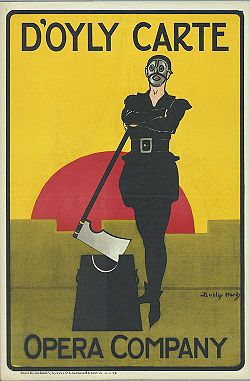
Selected recordings
- 1928 D'Oyly Carte – Conductor: Malcolm SargentMalcolm SargentSir Harold Malcolm Watts Sargent was an English conductor, organist and composer widely regarded as Britain's leading conductor of choral works...
- 1950 D'Oyly Carte – Conductor: Isidore GodfreyIsidore GodfreyIsidore Godfrey was musical director of the D'Oyly Carte Opera Company for 39 years, from 1929 to 1968...
- 1958 Sargent/Glyndebourne – Pro Arte OrchestraPro Arte Orchestra-Background:The Pro Arte Orchestra was founded as a limited company chaired by the double-bass player Eugene Cruft; directors also included Archie Camden and Antony English. The initial aim was to perform "the finest of the lighter classics in orchestral music"...
, Glyndebourne Festival Chorus, Conductor: Sir Malcolm Sargent - 1964 D'Oyly Carte – Royal Philharmonic Orchestra, Conductor: Sir Malcolm Sargent
- 1979 D'Oyly Carte – Royal Philharmonic Orchestra, Conductor: Royston NashRoyston NashRoyston Hulbert Nash is an English-born conductor, best known as a music director of the D'Oyly Carte Opera Company, who is now living in the U.S.-Life and career:...
- 1982 Brent Walker Productions (video) – Ambrosian Opera Chorus, London Symphony Orchestra, Conductor: Alexander FarisAlexander FarisAlexander "Sandy" Faris is an Irish composer, conductor and writer, known for his television theme tunes. He has composed and recorded many operas and musicals, and has composed film scores and orchestral works.-Life and career:...
; Stage Director: Anthony Besch - 1993 Marriner/Philips (with abr. dialogue) – Academy and Chorus of St Martin in the Fields, Conductor: Sir Neville MarrinerNeville MarrinerSir Neville Marriner is an English conductor and violinist.-Biography:Marriner was born in Lincoln and studied at the Royal College of Music and the Paris Conservatoire. He played the violin in the Philharmonia Orchestra, the Martin String Quartet and London Symphony Orchestra, playing with the...
- 1993 New D'Oyly Carte – Conductor: John Owen Edwards
- 1995 Mackerras/Telarc – Orchestra & Chorus of the Welsh National Opera, Conductor: Sir Charles MackerrasCharles MackerrasSir Alan Charles Maclaurin Mackerras, AC, CH, CBE was an Australian conductor. He was an authority on the operas of Janáček and Mozart, and the comic operas of Gilbert and Sullivan...
Cultural impact
The musical group Peter, Paul and MaryPeter, Paul and Mary
Peter, Paul and Mary were an American folk-singing trio whose nearly 50-year career began with their rise to become a paradigm for 1960s folk music. The trio was composed of Peter Yarrow, Paul Stookey and Mary Travers...
included the song, "I have a song to sing, O!" on one of their children's albums, Peter, Paul and Mommy
Peter, Paul and Mommy
Peter, Paul and Mommy, released on Warner Bros. in 1969, is the trio Peter, Paul and Mary's first children's album. It has hits like "Puff the Magic Dragon" among others...
(1969).
In 1973, a BBC TV Play for Today
Play for Today
Play for Today is a British television anthology drama series, produced by the BBC and transmitted on BBC1 from 1970 to 1984. During the run, more than three hundred programmes, featuring original television plays, and adaptations of stage plays and novels, were transmitted...
production, Jack Point, by Colin Welland
Colin Welland
Colin Welland is a British actor and screenwriter. He won the Academy Award for Best Original Screenplay for his script for Chariots of Fire ,,,....
, directed by Michael Apted
Michael Apted
Michael David Apted, CMG is an English director, producer, writer and actor. He is one of the most prolific British film directors of his generation but is best known for his work on the Up Series of documentaries and the James Bond film The World Is Not Enough.On 29 June 2003 he was elected...
, concerned the tensions in an amateur theatre group during a production of Yeomen, particularly the casting of the part of Jack Point.
External links
- The Yeomen of the Guard at The Gilbert & Sullivan Archive
- The Yeomen of the Guard at The Gilbert & Sullivan Discography
- Complete vocal score (this may take a while to download)
- Discussion of Yeomen
- Information about the background of Yeomen
- Bab illustrations of lyrics from Yeomen
- Biographies of the people listed in the historical casting chart
- Gilbert & Sullivan song parodies, including some from Yeomen
- Photos of D'Oyly Carte productions of Yeomen, 1888 - 1980

